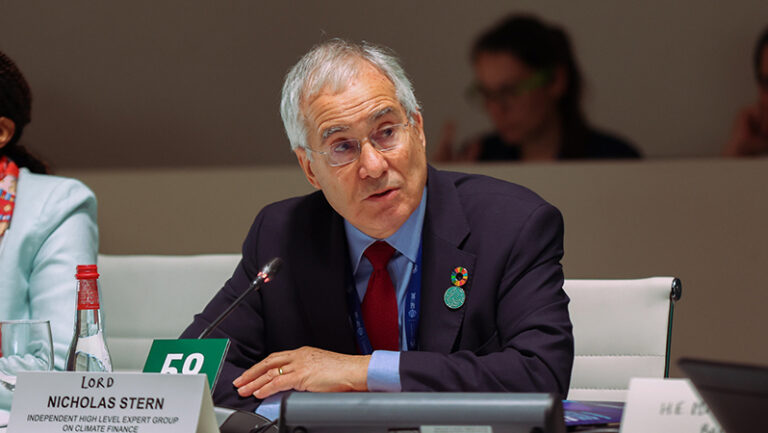Lord Nicholas Stern responds to Global Stocktake agreement

Responding to the decisions reached today (Wednesday 13 December 2023) at the COP28 United Nations climate change summit in Dubai, Professor Lord Nicholas Stern, Chair of the Grantham Research Institute on Climate Change and the Environment at the London School of Economics and Political Science, and Co-Chair of the Independent High-Level Expert Group on Climate Finance, said: “The results of the Global Stocktake show clearly that the world is badly off track in the task of realising the goals of the Paris Agreement. Failure to achieve the Paris Agreement would leave the world in a very dangerous state.
“As the second report of the Independent High Level Expert Group on Climate Finance (IHLEG), which was launched at COP28, concluded, the problems highlighted by the Global Stocktake are due to a lack of investment in the zero-emissions and climate-resilient economy, particularly in emerging market and developing countries. Getting back on track requires fostering and financing that investment.
“The agreement achieved today is historic and of real value. The decision on the Global Stocktake explicitly recognises, for the first time in the outcome of a United Nations climate change summit, that the world needs to transition away from all fossil fuels, and towards cleaner alternatives, particularly renewables. It is clear that this transition must be worldwide, at scale, and urgent. While the text of the decision may not be as strong as some have hoped, it is clear that this transition must be powerful and urgent to achieve net zero emissions of greenhouse gases globally by 2050.
“Countries must now respond to the outcome of COP28 through a huge increase in investment in zero-emissions and climate-resilient economic development and growth, particularly in developing countries. The text of the Global Stocktake decision rightly stresses the need to mobilise trillions of dollars in investment to accelerate cuts in greenhouse gases, strengthen adaptation and resilience, and respond to loss and damage. That is a challenge that must now be taken forward by finance ministries and the international financial institutions, including the multilateral development banks (MDBs). The IHLEG report sets out how this can be done – a tripling of financing for MDBs and a much closer relationship with the private sector to unleash the huge opportunities in clean and resilient investment, particularly renewables.
“The goals of the Paris Agreement will not be realised without a major and rapid increase in investment, particularly in emerging market and developing countries.”
ENDS

